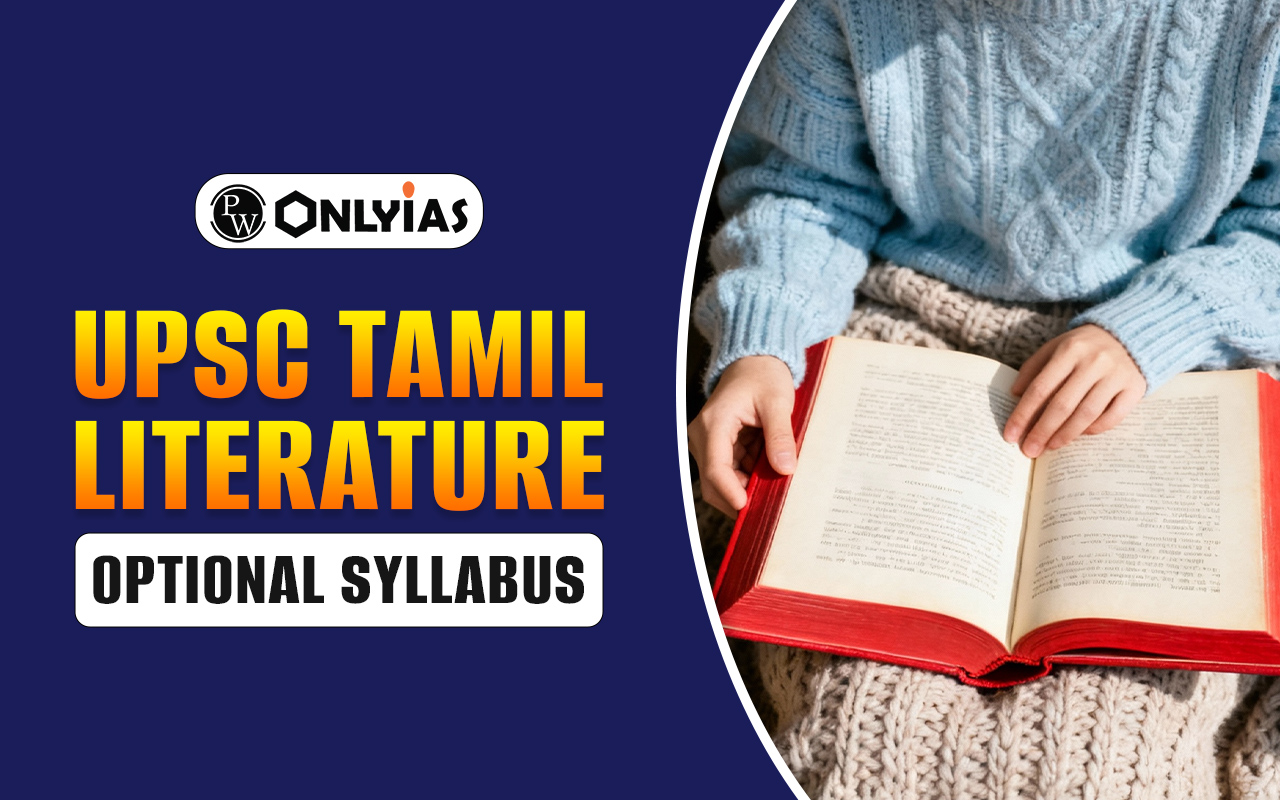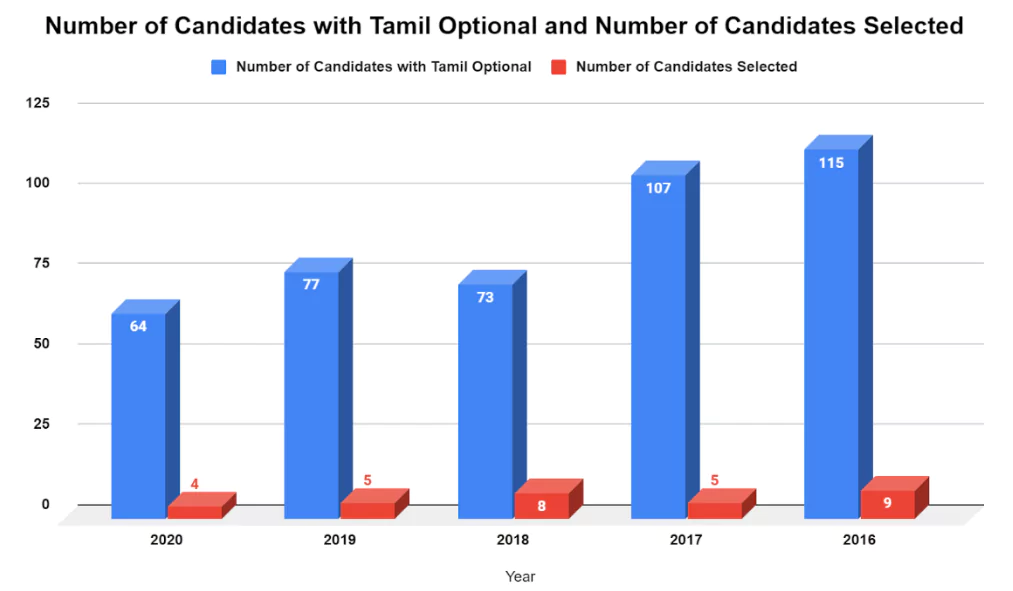Tamil Literature Optional is a popular UPSC literature subject covering classical, medieval, and modern Tamil works. It suits candidates with strong interest in Tamil language and culture and offers good scoring potential with focused preparation.

Tamil literature Optional is one of the literature optional subject lists mentioned in UPSC optional subject list. It is mentioned in the UPSC notification under the literature language optional category “Literature of any one of the following languages.” It is among the most chosen literature optional subjects. It is one of the 23 literary languages on the UPSC list.
If candidates have genuine interest in Tamil literature and have exposure to the Tamil language and its cultural context, opting for this subject will make studying and preparing for the exam more enjoyable and motivating. In this article, we will try to look closely at Tamil literature from all possible dimensions to help students do well and get high marks in this subject.
UPSC allows candidates to choose Tamil literature as their optional subject for the exam. This subject covers various aspects of Tamil literature, including ancient Sangam literature, medieval works, modern literature, poetry, prose, drama, literary criticism, and cultural aspects. Tamil literature, as an optional subject, provides candidates with insights into the rich literary tradition and cultural heritage of Tamil Nadu. It requires a comprehensive understanding of Tamil language, grammar, and literary techniques. Candidates who choose Tamil Optional as an optional subject need to go deep into the works of renowned Tamil authors and poets, analyzing themes, styles, and historical contexts. Tamil has been designated as a classical language, along with Odia, Sanskrit, Kannada, Telugu, and Malayalam
Like all other optional subjects on UPSC optional subject list, the subject is made up of two papers, Paper I and Paper II, each carrying 250 marks. Each paper is divided into two sections. Each paper has a total of eight questions, divided equally into four questions.
Candidates have to attempt any five questions. Question 1 and Question 5 are compulsory. Out of the remaining six, any three have to be attempted, with at least one from each section. Answers must be written in Tamil only.
UPSC Tamil Literature Optional Exam Pattern |
|
| Particular | Details |
| Total Papers | Two papers, Paper I and Paper II |
| Total Marks | 500 (250 Each) |
| Time allowed | 3 Hours for each paper |
| Sections | Section A and Section B |
| Questions | total 8 questions with subparts |
| Compulsory Question | Question Nos. 1 and 5 |
| Marks Distribution | 10, 15, and 20 marker questions |
The UPSC Tamil Literature Optional Syllabus covers a broad range of topics, ranging from ancient Sangam literature to modern Tamil works. It includes the study of classical texts, medieval poetry, and contemporary literature. In the Tamil Literature Optional Syllabus, candidates will find literary criticism, exploring various approaches to analyzing Tamil literary works. Cultural aspects such as folklore and socio-political contexts are also integral parts of the syllabus. Overall, the syllabus offers a comprehensive understanding of Tamil literary heritage, providing candidates with insights into language, culture, and literary traditions. By studying it well, candidates can achieve maximum marks in this exam. The syllabus of Tamil literature is divided into two segments, i.e., Paper 1 and Paper 2.
| UPSC Tamil Literature Optional Syllabus | |
| Tamil Literature Optional Syllabus Papers | Topics |
| UPSC Tamil Literature Syllabus Paper 1 | History of Tamil Language
History of Tamil Literature |
| UPSC Tamil Literature Syllabus Paper 2 | The paper will require first-hand reading of the text prescribed and will be designed to test the critical ability of the candidate. |
Paper I of the UPSC Tamil Literature Optional Syllabus focuses on the foundational aspects of the language and its literature. It explores the history of Tamil, exploring its place among Indian languages and its connection to the Dravidian family. Candidates will also study the evolution of Tamil literature throughout history, including the landmark Sangam period and the development of ethical literature. Paper 1 touches on recent trends in Tamil studies and the vibrant world of Tamil folk literature, rounding out the understanding of the language’s cultural heritage. Answers must be written in Tamil.
| Section A | |
|
|
| Section B | |
|
Paper II of the UPSC Tamil Literature Optional Syllabus offers a deep dive into specific literary works. Prepare to analyze ancient classics like Sangam poems, then tackle excerpts from epic masterpieces like Silappadikaram and Kambaramayanam. Candidates will also get exposure to devotional poetry and explore modern literature’s diverse forms, from poetry to drama. While some specific texts are prescribed, a strong understanding of modern movements. Find the detailed syllabus below.
|
Section A |
|
|
Section B |
|
UPSC Tamil Literature Optional Syllabus 2026 PDF outlines the detailed syllabus prescribed by the Union Public Service Commission for the Civil Services Examination. It includes topics for Paper I and Paper II, covering classical and modern Tamil literature. Candidates can download the official syllabus PDF to understand the exam pattern, important themes, and prepare strategically for the optional subject.
Candidates should choose books wisely from a wide range of options to score good marks in UPSC Tamil literature optional exam in IAS exam. The right books will help them cover all the topics easily and gain a better and more in-depth understanding of the exam sections. To ensure the best preparation, candidates can refer to the Tamil literature books and other subject-specific books mentioned below to score high marks in the exam.
Optional subjects in UPSC are numerous, and each subject has its own domain. That is why each subject has its own advantages and disadvantages, depending on the interest and background of candidates. Still, we try to find out some advantages and disadvantages of Tamil Optional subjects.
| Advantages | Disadvantages |
|
|
UPSC Tamil Optional Question Papers from 2018 to 2025 are readily available for aspirants seeking to enhance their preparation. We provide access to the UPSC Tamil optional question papers in PDF format, an invaluable resource for your preparation.
UPSC Tamil Optional Previous Year Question Papers |
|
| Year | UPSC Tamil Optional Question Papers PDF Link |
| 2025 | UPSC Tamil Optional Paper 1 |
| 2024 | UPSC Tamil Optional Paper 1 |
| 2023 | UPSC Tamil Optional Paper 1 |
| 2022 | UPSC Tamil Optional Paper 1 |
| 2021 | UPSC Tamil Optional Paper 1 |
| 2020 | UPSC Tamil Optional Paper 1 |
| 2019 | UPSC Tamil Optional Paper 1 |
| 2018 | UPSC Tamil Optional Paper 1 |
The table below offers a comprehensive overview of the success rate achieved by candidates who opted for Tamil throughout the year.
UPSC Tamil Optional Success Rate |
|||
| Year | Number of Candidates with Tamil Optional | Number of Candidates Selected | Success Rate (%) |
| 2020 | 64 | 4 | 6.3% |
| 2019 | 77 | 5 | 6.5% |
| 2018 | 73 | 8 | 11.0% |
| 2017 | 107 | 5 | 4.7% |
| 2016 | 115 | 9 | 7.8% |

| Year | Name | Rank |
| 2022 | Gee Gee A.S | 107 |
| 2020 | Priyanga R A | 181 |
| 2019 | Murukanantam | 119 |
| 2018 | Ms. Chitraa | 296 |
Getting a good score in the UPSC exam for Tamil literature needs careful planning and doing things step by step. It’s important to get help from different places to do well in the exam. If you’re getting ready for the Tamil literature part of the exam, you can do better by following these steps:
Answer Sheets of the toppers who have given mock tests for Tamil Literature Optional can help candidates get familiar with the writing style and flow of the answer that UPSC demands and can excel in this exam. The topper marksheet can be easily available to various blogs and telegram groups, where candidates can avail themselves of it and analyse it.
Preparing for any optional subject is not enough without planning. If candidates are willing to choose Tamil Literature as their optional subject, then they need to have a plan for both General Studies and Tamil Literature separately. This is because for literature, candidates need to practice writing in the language script. Also, candidates can look at previous successful candidates’ notes and watch their strategy videos to make their own plan for handling the challenges.
| Must Read | |
| NCERT Notes For UPSC | UPSC Daily Current Affairs |
| UPSC Blogs | UPSC Daily Editorials |
| Daily Current Affairs Quiz | Daily Main Answer Writing |
| UPSC Mains Previous Year Papers | UPSC Test Series |
Check Out UPSC CSE Books
Visit PW Store
Tamil can be a good optional subject for the UPSC exam for candidates who have a strong command of the language or have studied it extensively. It offers an opportunity to express their knowledge and expertise in Tamil literature and language.
The Tamil Optional Paper is designed to evaluate a candidate's knowledge of Tamil literature, including specific texts, literary movements, and critical perspectives. It often includes questions that assess a candidate's analytical and interpretive abilities in the context of Tamil literature.
The UPSC essay paper needs to be written in either English or any of the scheduled languages mentioned in the Eighth Schedule of the Constitution of India. Tamil is one of the scheduled languages, so it is allowed for the essay paper.
No, Tamil Paper 1 and Tamil Compulsory Papers are not the same in the UPSC exam. Tamil Paper 1 typically refers to the optional subject paper where candidates can choose Tamil literature as their optional subject. On the other hand, Tamil Compulsory Papers usually refer to the language papers that are compulsory for all candidates, which include the Tamil language paper along with papers for English and other Indian languages.
It depends, Candidates with non Tamil background can find it very challenging to opt this subject.
It's advisable to choose a literature optional subject for UPSC if you've extensively studied it during your college years. This is because the preparation involves reading a significant amount of material. Additionally, finding coaching resources for these optional subjects might be limited, so prior familiarity with the subject can be beneficial.
<div class="new-fform">
</div>